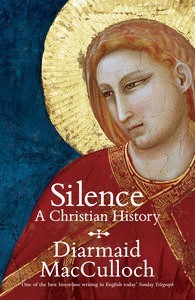 A review of Silence: A Christian History by Diarmaid MacCulloch. Published in Australia by Allen Lane.
A review of Silence: A Christian History by Diarmaid MacCulloch. Published in Australia by Allen Lane.
Our modern society is full of noise, and this affects our souls as much as our ears. I tried to read portions of this book on a public bus where the passengers are subjected to loud and inane FM radio on their journeys (despite the fact that many have headphones in anyway). This noise pollution we experience every day is not merely incidental annoyance – it prevents us from thinking deeply about things, something we are able to do best in the moments of clarity created by silence.
Diarmaid MacCulloch, author of the recent, monumental A History of Christianity, investigates the phenomenon of silence in Christianity, and, unlike his previous work, which necessitated a certain amount of speed to get through the vast terrain, here he can linger in a few spots to take in the view. He is a penetrating historian who lays out a wealth of material within which there are glinting details. For example, he off-handedly wonders whether Muslims were inspired to build minarets after seeing the Stylites, those ascetics who perched themselves on the top of tall columns. In another insightful move, he compares the sign language of the monks at Cluny to that of workers in the factories of the early industrial revolution. He also notes the Christianity’s ambiguous reception of silence, where it has been viewed as both good and bad.
Christianity is, after-all, a religion of words and the Word. In the Old Testament, silence in the Temple liturgy was only a late development, and the prophets often view the silence of God as disastrous. MacCulloch notes that the Hebrew words used for desolation and ruin often have connotations of silence. But the growing influence of the Greeks also created within Judaism the idea of God’s silence being part of his majesty. The image of an unfathomable God who is unable to be spoken of supplements the image of the loving but often angry father with whom the Israelites talk.
In the New Testament, Jesus uses silence in key moments in his ministry, such as when the adulterous woman is about to be stoned, when he appears before Pilate, and when he needs rejuvenation away from the crowds. And of course the core of Christianity – the resurrection itself – is a silent event, noted but undescribed, circled by the many words of the Gospels.
MacCulloch claims silence was devalued in the Pauline stream of Christianity, but reared its quiet head in various Gnostic movements, finally finding a prominent place amongst monastic movements and the (silent) contemplation of icons in the East where there was less reliance on preaching. The seclusion of the monasteries fostered their spiritual work by taking monks away from the noisy laity. They turned the negative tone of a biblical phrase such as “mouths they have but speak not” into positive and took heed of the psalmist’s warning that “a man full of words will not prosper”.
Aside from the spiritual use of silence, there are also times where silence is enforced to hide things, and in this regard MacCulloch is a good postmodernist, seeing power everywhere and assuming that what is deemed heretical and is suppressed is threatening to authority rather than erroneous. It can be argued that the history of creeds and councils is more than simply one of power struggles between Christians holding equally valid doctrines. That said, he digs up surprising and intriguing sections of Christianity’s underground, such as the associations of gay Anglican clergy who, counter-intuitively, were unsettled by the growing liberation movements of the later twentieth century.
As a historian who is (by his own admission in A History of Christianity) on the fringes of Christianity and not practicing, he gives us detail and analysis, but not much in the way of how it actually feels to experience silence in a spiritual context. For that, readers are well advised to go to the likes of Sara Maitland or Kathleen Norris, whose books can be seen as complementary, rather than alternatives to MacCulloch’s. All three would agree though that it is important to recapture the stillness that has a rich tradition in Christianity, as an alternative to the noise of modern life. We moderns may be better informed but no wiser. As the mystic Isaac of Ninevah explained, we need silence in order to think about the words we hear. It is no wonder that authoritarian regimes, be they political or clerical, are often the noisiest. And, according to MacCulloch, it is no wonder that groups who value silence the highest, such as the Quakers, are those that challenge injustices. Silence not only makes us wiser, but more moral too.
Nick Mattiske works in the book trade and is the author of Notes on Books and Music (Mosaic Press).
Email This Story
Why not send this to a friend?



